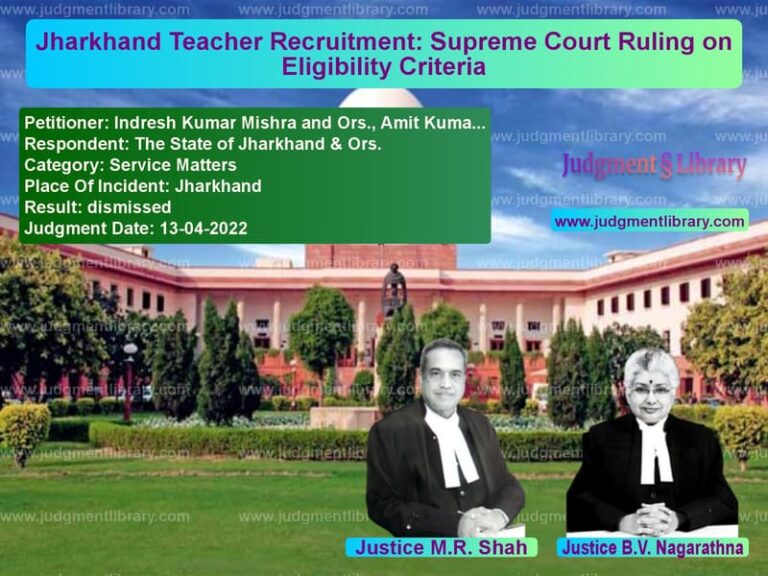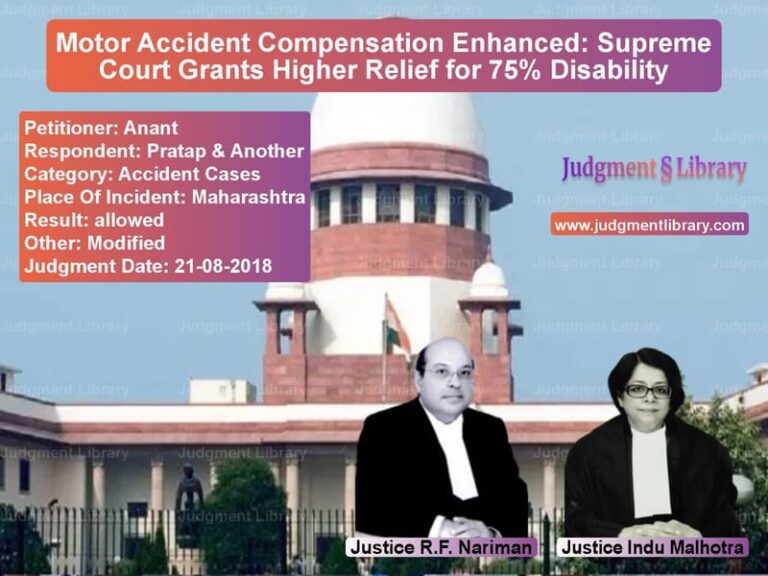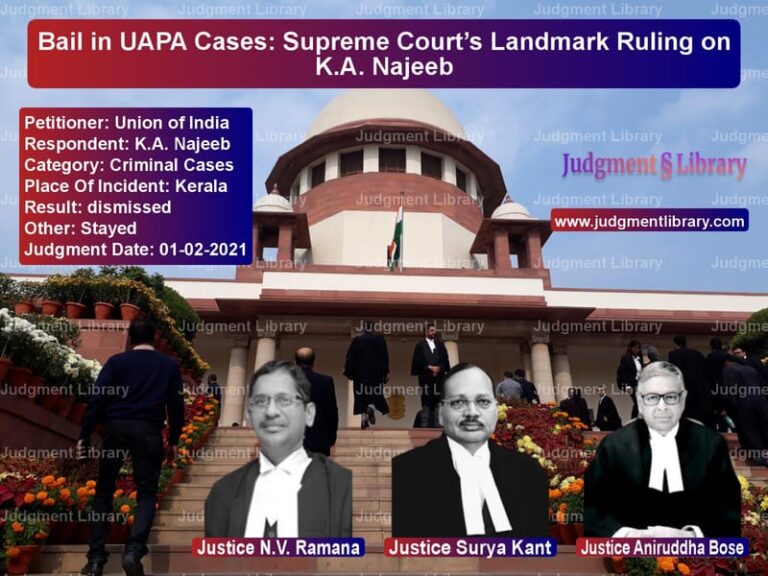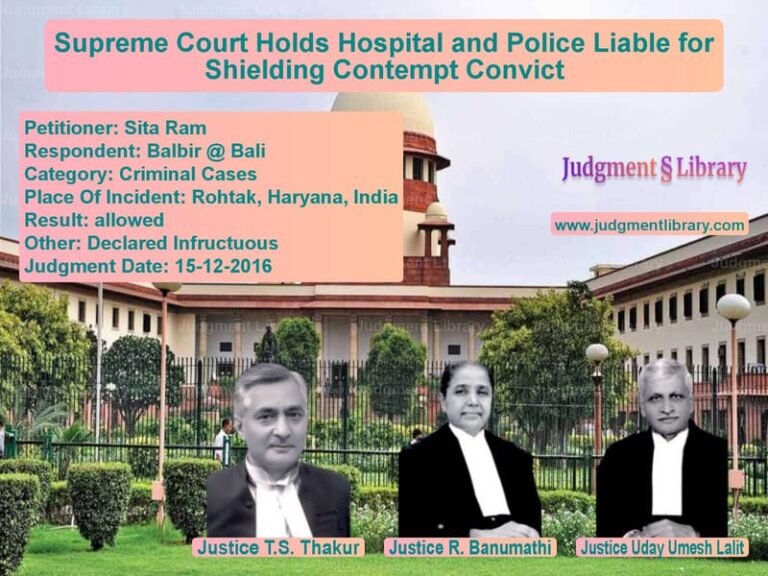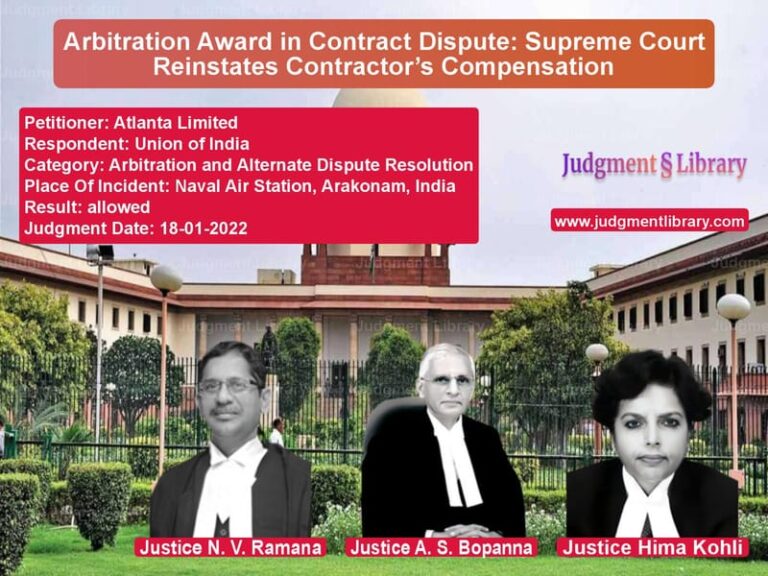Reinstatement and Back Wages: Supreme Court Rules on Wrongful Dismissal Case
On 20th September 2018, the Supreme Court of India delivered a crucial judgment in Rajasthan State Road Transport Corporation, Jaipur v. Shri Phool Chand (Dead) Through L.Rs., addressing the issue of **wrongful dismissal, reinstatement, and back wages** in a public sector employment dispute. The key question was whether an employee dismissed for **dereliction of duty** should be granted **full back wages** after reinstatement.
The Supreme Court ruled that **awarding full back wages as a matter of right is incorrect** and that the courts must assess whether the employee was **gainfully employed** during the period of dismissal. The Court modified the decision of the lower courts and awarded **50% back wages** instead of full wages.
Background of the Case
The case involved the **Rajasthan State Road Transport Corporation (RSRTC)** and an employee, **Shri Phool Chand**, who worked as a driver. He was dismissed from service due to **continuous absence from duty**. The disciplinary inquiry found him guilty of **dereliction of duty**, leading to his dismissal.
The employee challenged his dismissal before the **Labour Court**, which ruled in his favor, ordering **reinstatement with full back wages** for **13 years (16th November 1983 to 24th February 1996)**. The **Rajasthan High Court** upheld this decision, prompting RSRTC to appeal before the Supreme Court.
Legal Issues and Key Questions
The Supreme Court was required to determine:
- Was the **dismissal of the employee** legally justified?
- Should the **Labour Court** have awarded **full back wages**?
- Did the employee provide **evidence of unemployment** during the dismissal period?
- What is the correct legal approach to **awarding back wages**?
Arguments by the Appellant (Rajasthan State Road Transport Corporation – RSRTC)
The RSRTC, represented by legal counsel, made the following arguments:
- The **employee was repeatedly absent from duty**, causing disruption in transport services.
- The **disciplinary inquiry was properly conducted**, and the dismissal was justified.
- The **Labour Court erred** in awarding **full back wages** without assessing whether the employee had been **gainfully employed elsewhere** during the dismissal period.
- The **employer should not be forced to pay wages** for years when the employee was not working.
Arguments by the Respondents (Legal Representatives of Shri Phool Chand)
The respondents, representing the deceased employee, countered:
- The employee had served **faithfully for years** before his dismissal.
- The dismissal was **disproportionate** to the alleged offense.
- The **Labour Court was correct** in awarding **full back wages**, as the employee had suffered financial hardship.
- The employer failed to **prove that the employee had alternative employment** during the dismissal period.
Supreme Court’s Observations
The Supreme Court, comprising **Justice Abhay Manohar Sapre and Justice S. Abdul Nazeer**, made the following observations:
On **awarding back wages**, the Court held:
“Back wages cannot be awarded as a matter of right merely because the dismissal order has been set aside.”
On **burden of proof**, the Court stated:
“The workman must plead and prove that he was not gainfully employed elsewhere after dismissal. The employer is also entitled to prove otherwise.”
On **judicial discretion in back wages**, the Court noted:
“Courts must consider the totality of circumstances, including the period of unemployment, financial hardship, and fairness to both parties.”
Final Judgment
The Supreme Court ruled in favor of **partially modifying** the High Court’s decision, stating:
“The award of full back wages is excessive. Instead, the respondents shall be entitled to 50% back wages for the dismissal period.”
The Court directed RSRTC to **calculate and pay the 50% back wages** within **three months**.
Impact of the Judgment
This ruling establishes key legal principles for wrongful dismissal and back wages. The key takeaways include:
- Back wages are not automatic: Employees must prove they were **not gainfully employed** during the dismissal period.
- Proportionality in relief: Courts should **balance fairness** by awarding **partial back wages** based on evidence.
- Employers have rights too: If the employer proves the employee had **alternative income**, back wages can be **denied or reduced**.
- Legal precedent for labor disputes: This ruling **guides future labor law cases** involving reinstatement and wages.
The decision ensures that **wrongfully dismissed employees receive fair compensation** while preventing **unjustified financial burdens on employers**.
Petitioner Name: Rajasthan State Road Transport Corporation, Jaipur.Respondent Name: Shri Phool Chand (Dead) Through L.Rs..Judgment By: Justice Abhay Manohar Sapre, Justice S. Abdul Nazeer.Place Of Incident: Rajasthan.Judgment Date: 20-09-2018.
Don’t miss out on the full details! Download the complete judgment in PDF format below and gain valuable insights instantly!
Download Judgment: Rajasthan State Road vs Shri Phool Chand (De Supreme Court of India Judgment Dated 20-09-2018.pdf
Direct Downlaod Judgment: Direct downlaod this Judgment
See all petitions in Employment Disputes
See all petitions in Termination Cases
See all petitions in Public Sector Employees
See all petitions in Judgment by Abhay Manohar Sapre
See all petitions in Judgment by S. Abdul Nazeer
See all petitions in partially allowed
See all petitions in Modified
See all petitions in supreme court of India judgments September 2018
See all petitions in 2018 judgments
See all posts in Service Matters Category
See all allowed petitions in Service Matters Category
See all Dismissed petitions in Service Matters Category
See all partially allowed petitions in Service Matters Category


